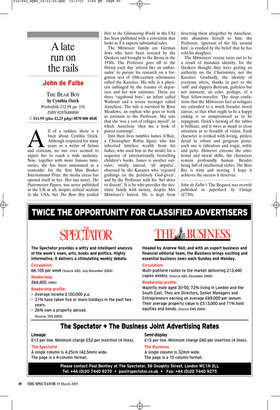A late run on the rails
John de Falbe
THE BEAR BOY by Cynthia Ozick
Weidenfeld, £12.99, pp. 310, ISBN 02978480898
✆ £11.99 (plus £2.25 p&p) 0870 800 4848 All of a sudden, there is a buzz about Cynthia Ozick. Although respected for many years as a writer of fiction and criticism, no one ever seemed to expect her to reach a wide audience. Now, together with more famous luminaries, she has been announced as a contender for the first Man Booker International Prize: the media circus has opened itself to her. Her last novel, The Puttermesser Papers, was never published in the UK at all, despite critical acclaim in the USA, but The Bear Boy (called Heir to the Glimmering World in the US) has been published with a conviction that looks as if it expects substantial sales.
The Mitwisser family are German Jews who have been rescued by the Quakers and brought to the Bronx in the 1930s. The Professor goes off to the library each day ‘attired like an ambassador’ to pursue his research on a forgotten sect of 10th-century schismatics called the Karaites. His wife is a physicist unhinged by the trauma of departure and her new existence. There are three ‘vagabond boys’, an infant called Waltraut and a severe teenager called Anneliese. The tale is narrated by Rose Meadows, an orphan who goes to work as assistant to the Professor. She says that she ‘was a sort of refugee myself’, at which Anneliese ‘shot me a look of purest contempt’.
Into their lives tumbles James A’Bair, a Christopher Robin figure who has inherited limitless wealth from his father, who used him as the model for a sequence of internationally bestselling children’s books. James is another outsider, totally amoral, ‘all impulse’, obsessed by the Karaites who ‘rejected graftings on the pristinely God-given’, and by the Professor with his ‘hot drive to dissent’. It is he who provides the destitute family with money, despite Mrs Mitwisser’s hatred. He is kept from deserting them altogether by Anneliese, who abandons herself to him; the Professor, ‘ignorant of the life around him’, is crushed by the belief that he has sold his daughter.
The Mitwissers’ rescue turns out to be a result of mistaken identity, for the Quakers thought they were getting an authority on the Charismites, not the Karaites. Gradually, the identity of everyone alters, thanks in part to the ‘soft’ and slippery Bertram, guileless but not innocent; an echo, perhaps, of a Nazi fellow-traveller. The deep confusions that the Mitwissers feel as refugees are extended to a much broader moral canvas, so that what ought to be a happy ending is so compromised as to be repugnant. Ozick’s turning of the tables is brilliant, and it owes as much to close attention as to breadth of vision. Each character is evoked with loving, pitiless detail in robust and gorgeous prose; each one is ridiculous and tragic, noble and petty. However extreme the emotional and moral shifts, the characters remain profoundly human. Besides being full of intellectual riches, The Bear Boy is witty and moving: I hope it achieves the success it deserves.
















































 Previous page
Previous page